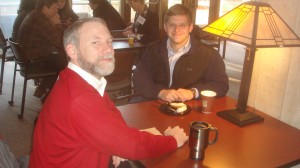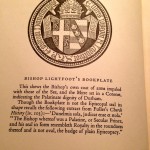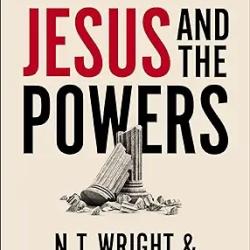Here below is a little interview with me about being one of the first John Wesley Fellows. See what you think (BW3). The picture immediately below is of Dr. Warren Smith (Duke) and Dr. Joel Lemon (Candler) at a recent John Wesley Fellows meeting which I attended.
Ben Witherington III
A New Testament scholar influencing the cultureBen Witherington
Witherington, a professor at Asbury Theological Seminary who has written more than 40 books, conducts seminars to combat Biblical illiteracy and is interviewed frequently on radio and TV.
Ben Witherington III applied to become a John Wesley Fellow before application forms to the program existed. He simply wrote his testimony to Dr. Edmund W. Robb Jr., a founder of A Foundation for Theological Education, and became one of the first two fellows more than 35 years ago.
“When I heard about this scholarship for evangelical United Methodists to get a doctorate and help renew the United Methodist Church, I said, ‘Whoa, they made this scholarship for me,’” he said.
After four years of college, three years of seminary and a month into his marriage, Witherington had sent his acceptance into the doctoral program at the University of Durham in England, not knowing where he would find the money to pay for it. Then over the summer, shortly before he was to leave for England, he received word that he would be awarded one of the inaugural John Wesley scholarships.
AFTE made the right investment in Witherington, who over the course of his career has been a prolific writer, producing more than 40 books on New Testament theology, and is considered one of the top evangelical scholars in the world.
Elected to the prestigious Studiorum Novi Testamenti Societas dedicated to New Testament study, he conducts seminars to combat Biblical illiteracy, presenting at churches and colleges across the U.S. and around the world. He is interviewed frequently on radio and TV and blogs regularly on the Patheos website.
All that without giving up his day job as a professor of New Testament interpretation at Asbury Theological Seminary, where he teaches master’s level courses and mentors a dozen doctoral students in the Biblical studies Ph.D. program.
Yet when he returned to the U.S. with his doctorate in 1980, many United Methodist seminaries would not hire evangelical scholars. “Seminaries were less representative of the whole spectrum of Methodism, and they wanted to keep it that way,” Witherington said. He harkened back to a mantra of Edmund Robb’s: “As go the seminaries, so go the pastors; as go the pastors, so go the churches.”
The John Wesley Fellowship asked for more inclusivity at the conservative end of the spectrum, and over the next 30 years, Witherington witnessed some dramatic changes toward that goal. He cites Duke University as an example.
“When I taught at Duke in 1982, United Methodist seminaries had few, if any, evangelicals on their faculty,” said Witherington, a North Carolina native. “Now Duke and Asbury Theological Seminary each have 13 John Wesley Fellows on faculty. Today John Wesley Fellows are among the first people interviewed for jobs at United Methodist colleges and seminaries.”
That trend bodes well for the church as a way to reverse a rather severe decline in membership in churches outside of the traditionally conservative Bible Belt. The next generation of church leaders needs more training in how to respond to a less Judeo-Christian culture and an increasingly religiously pluralistic culture.
“We’re becoming a more global church,” Witherington said, “and I see that as very important, that our congregations be more representative of our communities.”
Likewise with leadership: One size doesn’t fit all. What constitutes a good leader who faithfully pursues his or her call can’t be measured only by massive church growth. Witherington notes the importance of the Anglican pastor from a very small church who mentored Charles Spurgeon, a British Baptist who influenced thousands of Protestants across denominations.
“Good leadership can be personal witnessing to particular individuals,” he said. Seminaries, for instance, continue time-intensive doctoral programs that cost schools money.
“The programs are not a financial investment,” he said. “They’re an enormous investment in ministry.”















